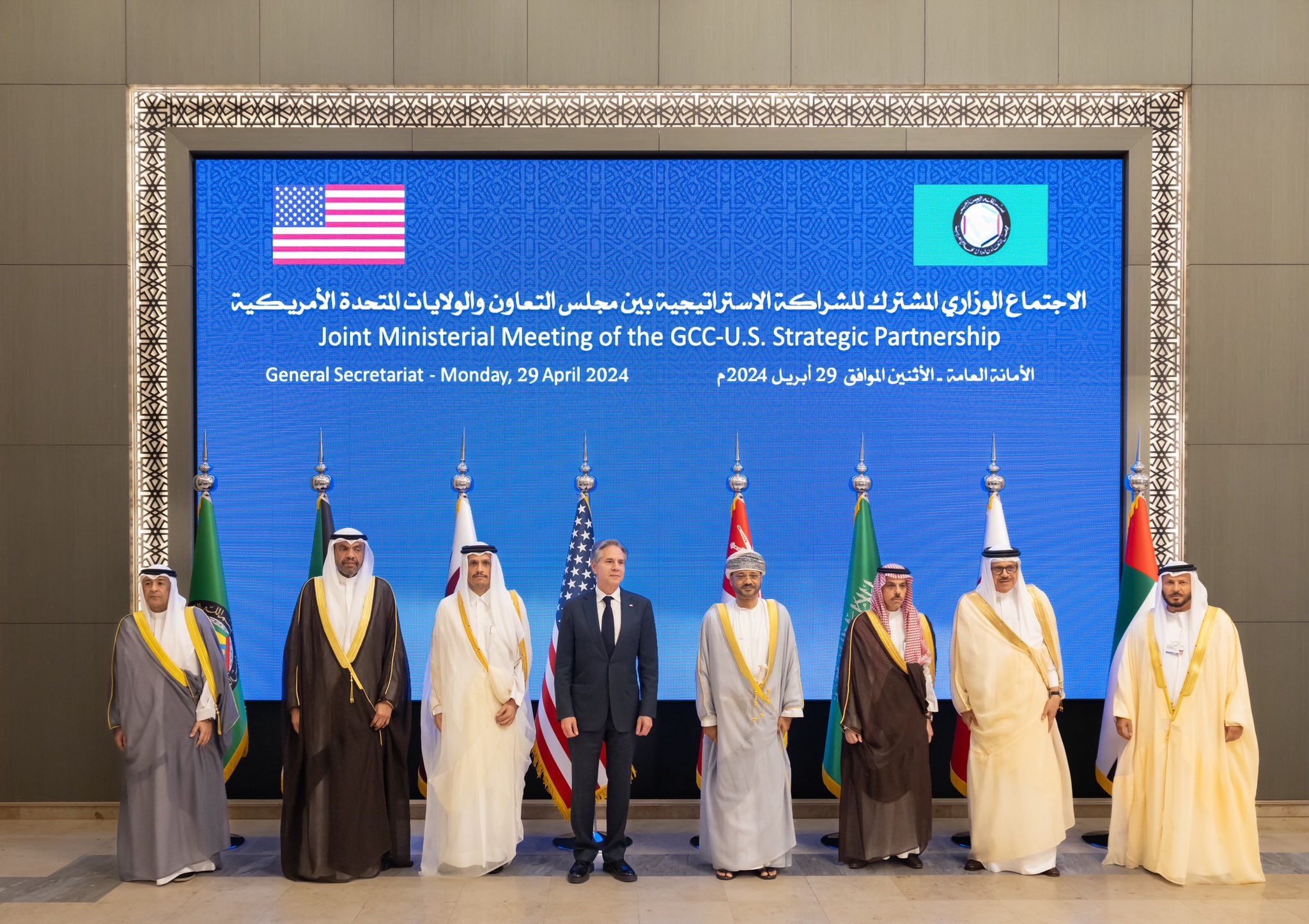The Qatari official also participated in a meeting in Riyadh to discuss efforts to implement the two-state solution and recognise Palestine’s statehood.
U.S. Secretary of State Antony Blinken praised Qatar’s Prime Minister Sheikh Mohammed bin Abdulrahman Al-Thani on Monday for his country’s “genuinely tireless efforts” in Gaza.
Blinken’s remarks came during a joint ministerial meeting in Riyadh between the Gulf Cooperation Council and the U.S. over the latest developments in the region, especially in Gaza.
“I want to thank the chair of the GCC, Qatar, and especially my friend Prime Minister and Foreign Minister Al Thani, for genuinely tireless efforts to try to find a path to an immediate ceasefire and release of hostages in Gaza. Thank you on a personal as well as professional level for everything that you’re doing,” Blinken said.
During his speech at the meeting, Sheikh Mohammed, who is also Qatar’s foreign minister, noted that the challenges facing the region include the international community’s failure “to find a solution to the Palestinian issue.”
The Qatari official reiterated his call for a ceasefire in Gaza and the entry of humanitarian aid into the besieged enclave. He also highlighted Doha’s ongoing efforts to reach a ceasefire and captives’ release deal in Gaza.
Meeting on two-state solution
On the same day, Sheikh Mohammed attended a coordination meeting in Riyadh at the invitation of Saudi Arabia and Norway to discuss efforts to implement the two-state solution and recognise Palestine’s statehood.
Officials at the meeting included officials from Palestine, Algeria, Bahrain, Egypt, Jordan, the United Arab Emirates, Belgium, Germany, France, Ireland, and the European Union among others.
On the sidelines of the meeting, The European Union’s High Representative for Foreign Affairs and Security Policy, Josep Borrell, told reporters that he would encourage Arab leaders to present a proposal over a two-state solution.
The EU official said he wanted the bloc’s member states to invite Arab leaders to Brussels to present the proposal.
“My only hope, my strong will, is to believe that if Arabs put on the table a proposal, Europeans will have to consider overcoming our divisions because it’s not a secret that the Europeans are strongly divided,” Borrell said.
“I will propose to member states to invite the Arabs to come to Brussels and to share with us their plan because we have to try to put together our approaches,” he added.
Borrell said that several European countries are expected to recognise Palestine’s statehood within the next month, AFP reported. The countries include Spain, Ireland, Belgium, Slovenia and Malta.
The meeting in Saudi Arabia came a week after the United Nations Security Council failed to adopt a draft resolution accepting Palestine’s full UN membership after the U.S. used its veto power.
Qatar had issued a statement on April 19 where it expressed “its deep regret at the failure” to adopt the resolution. Doha had described it as “a sad day for justice and a setback for efforts to bring peace to the region.”
Palestine is currently a “non-member observer state” whereas Israel enjoys a full membership.
In 2012, the bloc granted Palestine the status of a “non-member observer state” under a resolution adopted by the General Assembly. The full UN membership, if granted, would mean Palestine’s statehood is recognised internationally.
Israel received its membership in 1949, a year after the beginning of the Nakba, or catastrophe, in which Israel forcibly displaced and killed Palestinians to establish a Jewish state.
A total of 139 out of 193 UN member states currently recognise Palestine as a state.
Throughout the past seven decades of occupation, Israel has only acted with impunity, especially during its current genocidal war in Gaza.
Within nearly seven months, Israel has killed at least 34,535 people in Gaza. Israel also displaced at least 1.7 million people, according to the UN.
However, Israel’s crimes on the ground have exposed to the international community the occupation’s brutality while prompting several countries to adopt a stance in support of Palestine.
Last month, Spain, Ireland, Slovenia and Malta announced plans to recognise Palestine’s statehood in a joint statement.
“We are agreed that the only way to achieve lasting peace and stability in the region is through the implementation of a two-state solution, with Israeli and Palestinian States living side-by-side, in peace and security,” read the statement, issued on March 22.
The majority of the Latin American region has also doubled down on its criticism of Israel since the beginning of the genocide in Gaza.
On November 1, Bolivia officially cut ties with Israel while Chile and Colombia recalled their ambassadors in Tel Aviv.
Bolivia had already cut ties with Israel in 2009 under the administration of leftist President Evo Morales, who labelled Israel as a “terrorist state.”
In the Middle East, Jordan officially recalled its ambassador to Israel on November 1 over the “unprecedented humanitarian catastrophe” in Gaza. The kingdom said it would only send back its envoy if Israel halted its onslaught and called on Tel Aviv to recall its ambassador to Amman.







